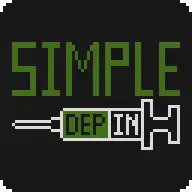Install Asset
Install via Godot
To maintain one source of truth, Godot Asset Library is just a mirror of the old asset library so you can download directly on Godot via the integrated asset library browser

Quick Information

Easily add Dependency Injection into your project.When the plugin is enabled, it will automatically create the necessary nodes in your current scene (preferably your Main). Simply move both nodes to the top of your scene tree (if not already) then add your node dependencies to the array in the [DependencyRegistrar] node and the [DependencyProvider] node will do the rest!To allow dependency injection to happen in any script attached to a node in the scene tree, simply create an _inject function. The _inject function is called on demand after _enter_tree and before _ready.This tool is useful in cases where:1. You do not have direct access (via @export) to the nodes you need in a script and do not wish to create a global singleton via autoload.2. You want a form of dependency inversion and wish to rely on abstractions to interact with other parts of your code.3. The nodes you need have their own in-scene dependencies that they need to have direct access (via @export) to.
dependency-injection-system
A simple DI implementation for Godot 4 made with GDScript.
Easily add Dependency Injection into your project.
When the plugin is enabled, it will automatically create the necessary nodes in your current scene (preferably your Main). Simply move both nodes to the top of your scene tree (if not already) then add your node dependencies to the array in the [DependencyRegistrar] node and the [DependencyProvider] node will do the rest!
To allow dependency injection to happen in any script attached to a node in the scene tree, simply create an _inject function. The _inject function is called on demand after _enter_tree and before _ready.
This tool is useful in cases where:
1. You do not have direct access (via @export) to the nodes you need in a script and do not wish to create a global singleton via autoload.
2. You want a form of dependency inversion and wish to rely on abstractions to interact with other parts of your code.
3. The nodes you need have their own in-scene dependencies that they need to have direct access (via @export) to.
Reviews
Quick Information

Easily add Dependency Injection into your project.When the plugin is enabled, it will automatically create the necessary nodes in your current scene (preferably your Main). Simply move both nodes to the top of your scene tree (if not already) then add your node dependencies to the array in the [DependencyRegistrar] node and the [DependencyProvider] node will do the rest!To allow dependency injection to happen in any script attached to a node in the scene tree, simply create an _inject function. The _inject function is called on demand after _enter_tree and before _ready.This tool is useful in cases where:1. You do not have direct access (via @export) to the nodes you need in a script and do not wish to create a global singleton via autoload.2. You want a form of dependency inversion and wish to rely on abstractions to interact with other parts of your code.3. The nodes you need have their own in-scene dependencies that they need to have direct access (via @export) to.

